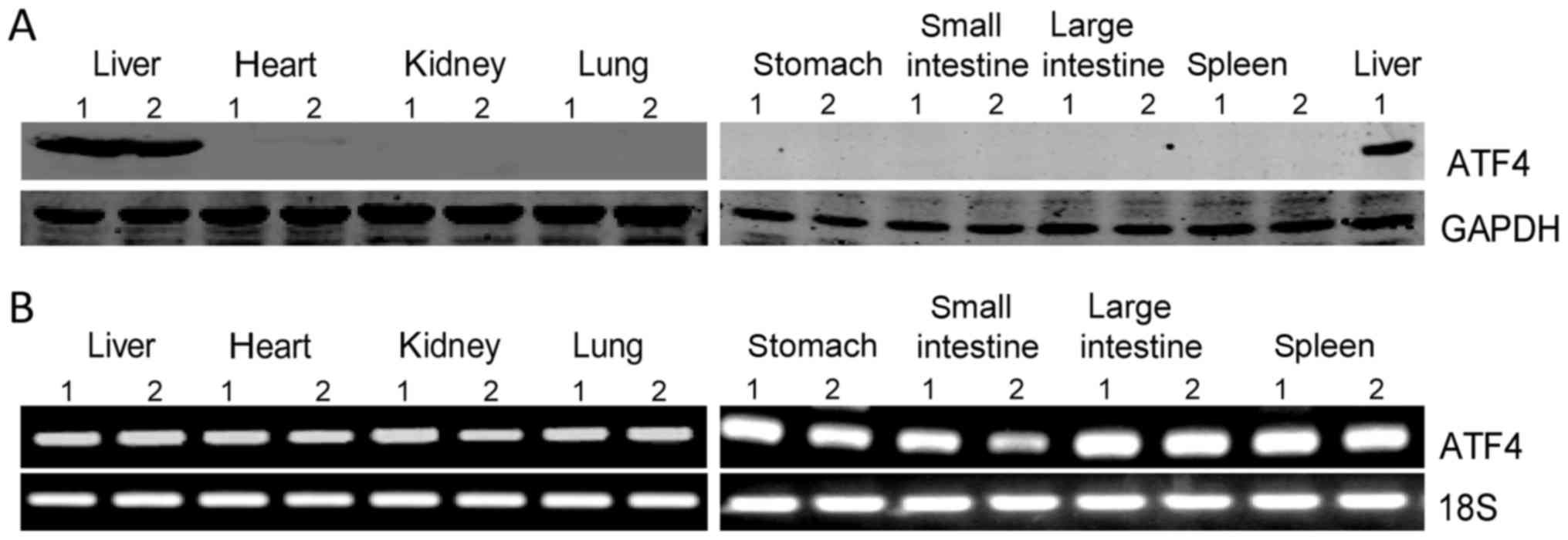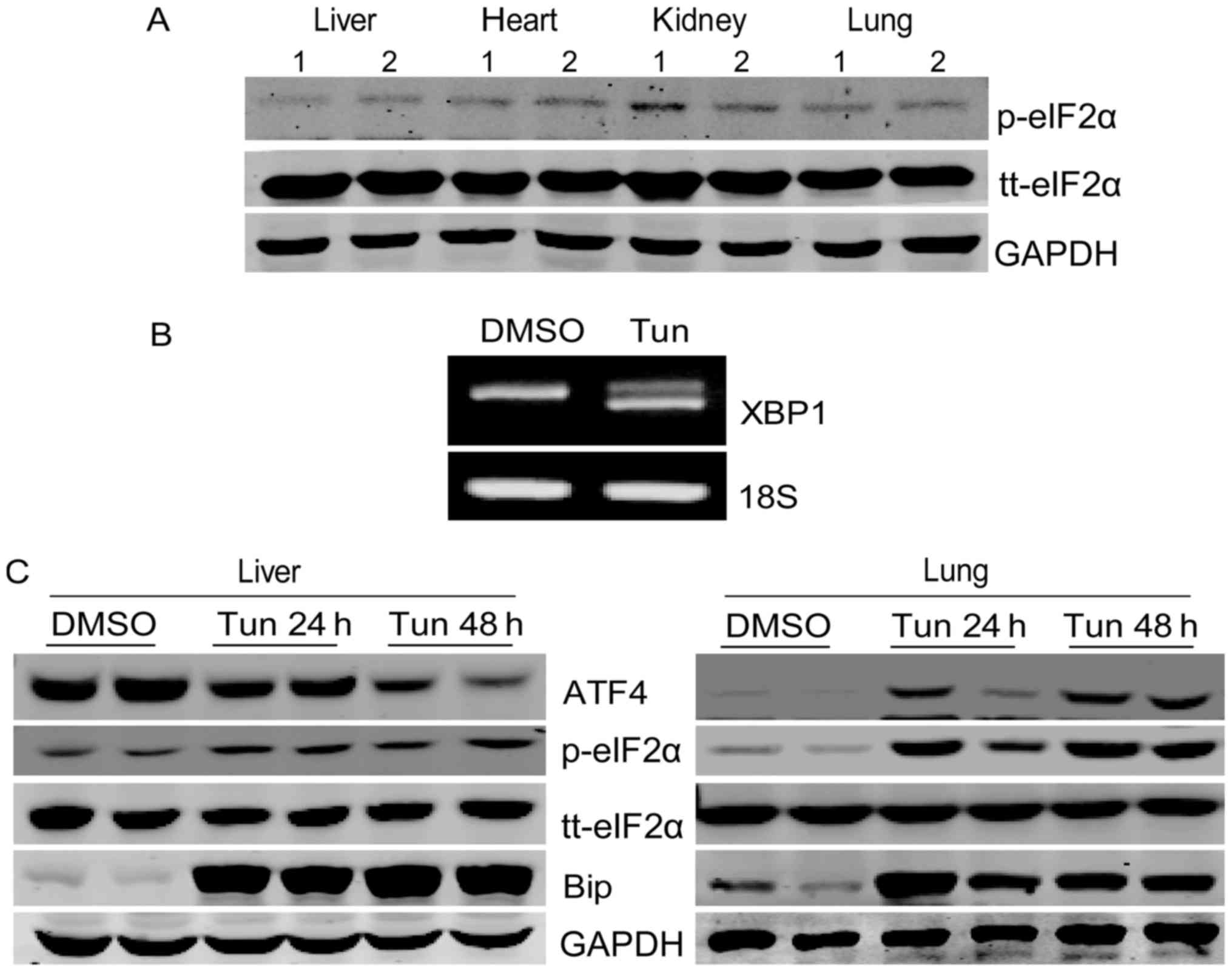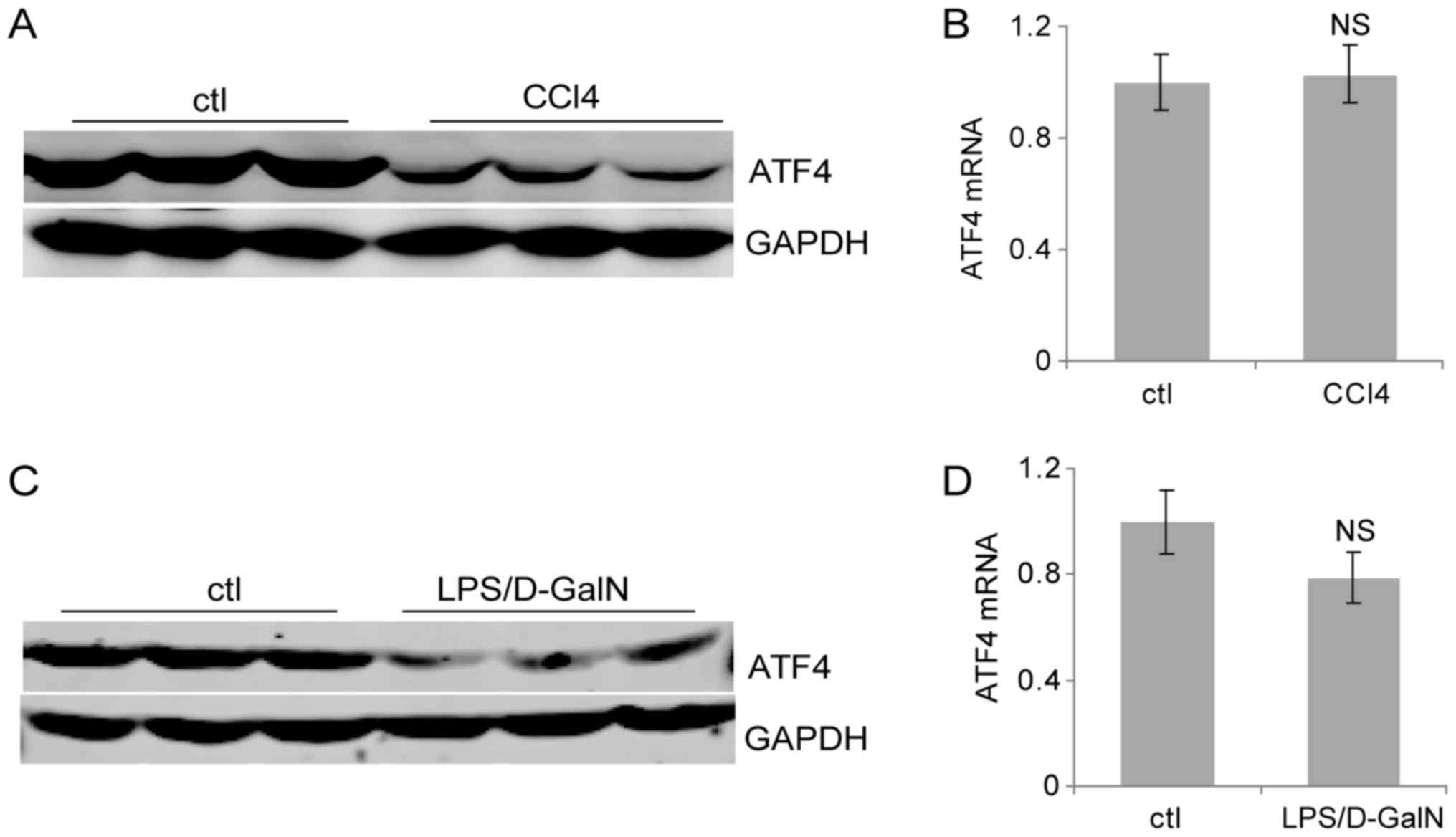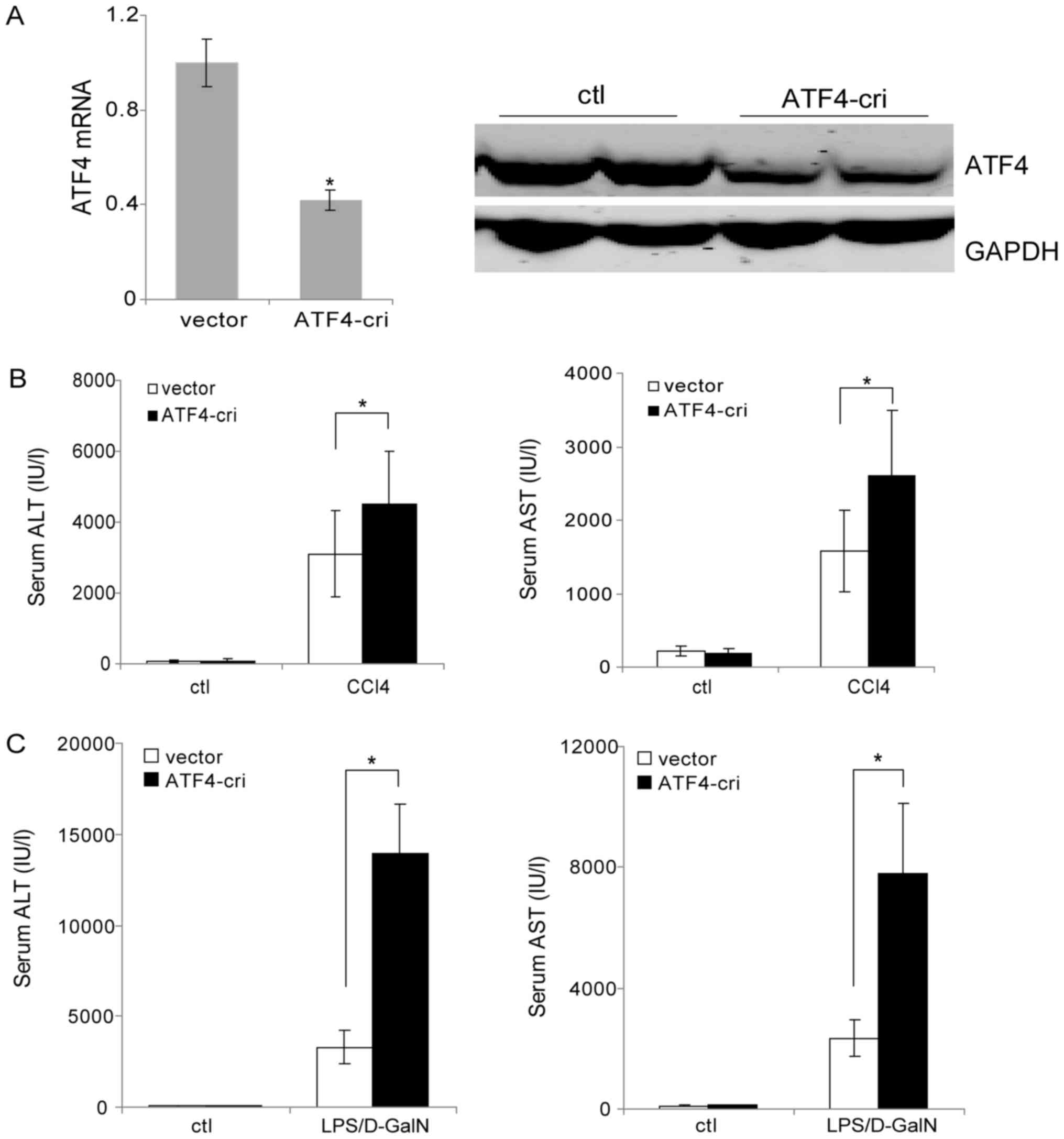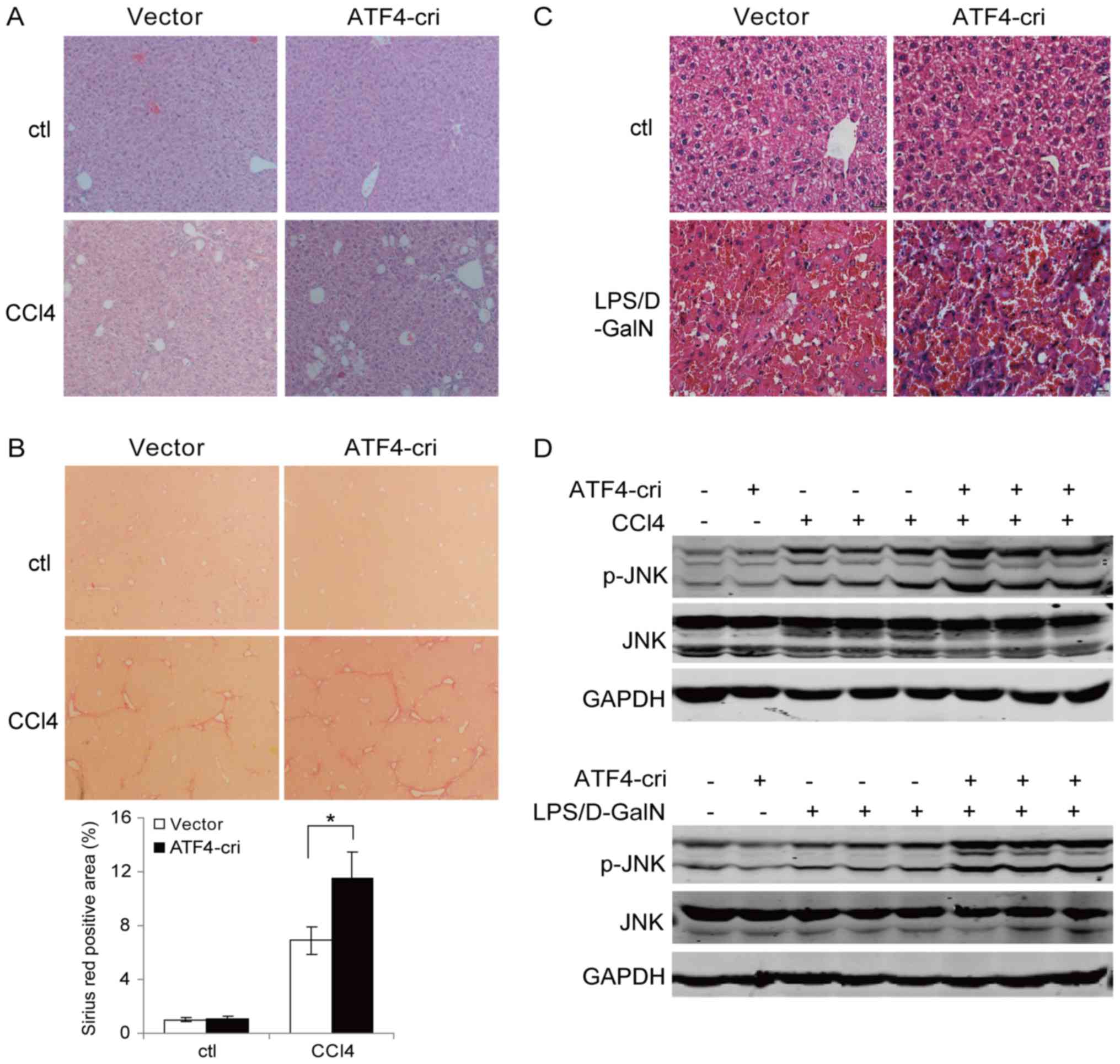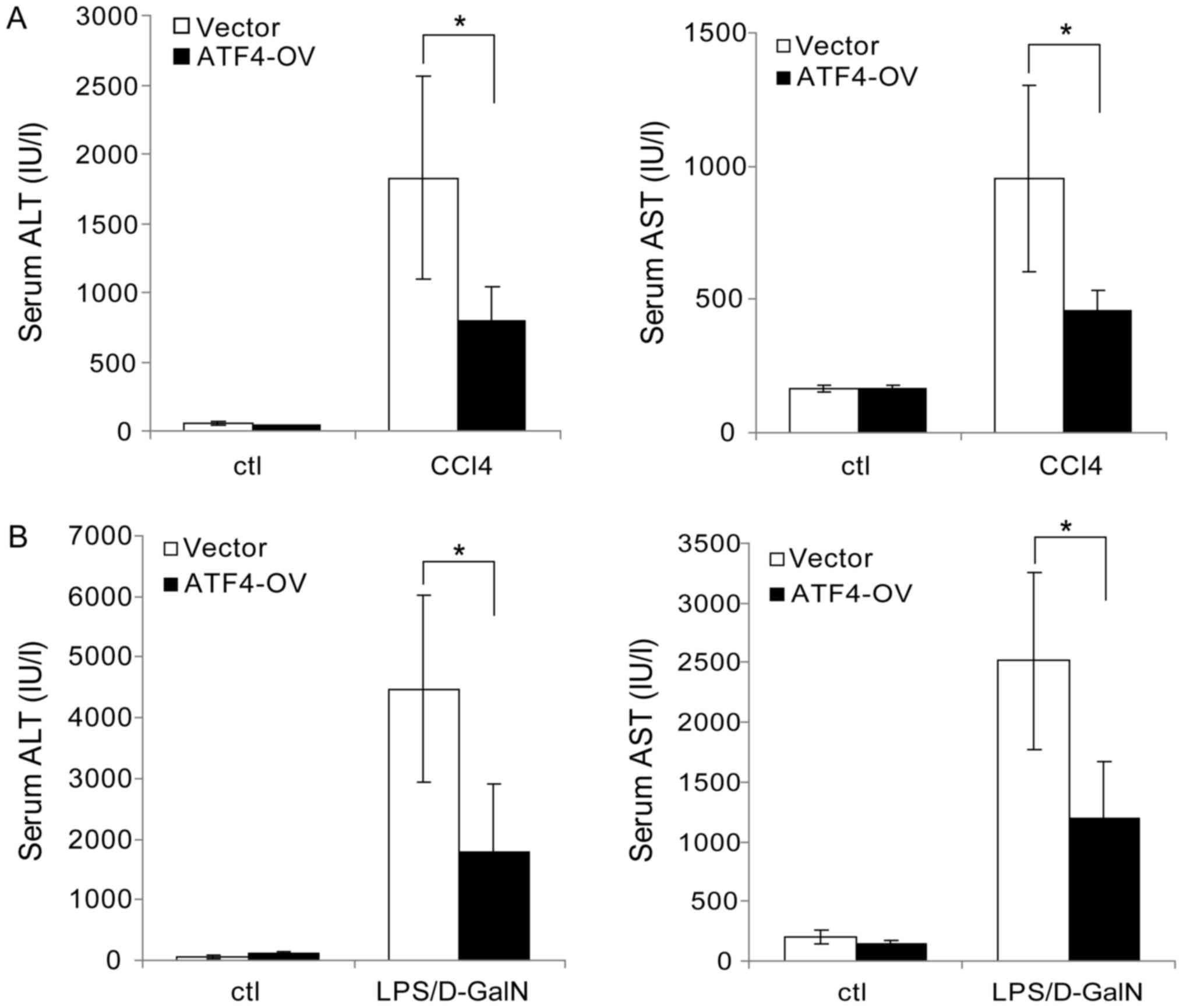|
1
|
Karpinski BA, Morle GD, Huggenvik J, Uhler
MD and Leiden JM: Molecular cloning of human CREB-2: An ATF/CREB
transcription factor that can negatively regulate transcription
from the cAMP response element. Proc Natl Acad Sci USA.
89:4820–4824. 1992. View Article : Google Scholar : PubMed/NCBI
|
|
2
|
Kilberg MS, Shan J and Su N:
ATF4-dependent transcription mediates signaling of amino acid
limitation. Trends Endocrinol Metab. 20:436–443. 2009. View Article : Google Scholar : PubMed/NCBI
|
|
3
|
Vattem KM and Wek RC: Reinitiation
involving upstream ORFs regulates ATF4 mRNA translation in
mammalian cells. Proc Natl Acad Sci USA. 101:11269–11274. 2004.
View Article : Google Scholar : PubMed/NCBI
|
|
4
|
Rutkowski DT and Kaufman RJ: All roads
lead to ATF4. Dev Cell. 4:442–444. 2003. View Article : Google Scholar : PubMed/NCBI
|
|
5
|
Wang Y, Alam GN, Ning Y, Visioli F, Dong
Z, Nör JE and Polverini PJ: The unfolded protein response induces
the angiogenic switch in human tumor cells through the PERK/ATF4
pathway. Cancer Res. 72:5396–5406. 2012. View Article : Google Scholar : PubMed/NCBI
|
|
6
|
Yang X, Matsuda K, Bialek P, Jacquot S,
Masuoka HC, Schinke T, Li L, Brancorsini S, Sassone-Corsi P, Townes
TM, et al: ATF4 is a substrate of RSK2 and an essential regulator
of osteoblast biology; implication for Coffin-Lowry Syndrome. Cell.
117:387–398. 2004. View Article : Google Scholar : PubMed/NCBI
|
|
7
|
Lange PS, Chavez JC, Pinto JT, Coppola G,
Sun CW, Townes TM, Geschwind DH and Ratan RR: ATF4 is an oxidative
stress-inducible, prodeath transcription factor in neurons in vitro
and in vivo. J Exp Med. 205:1227–1242. 2008. View Article : Google Scholar : PubMed/NCBI
|
|
8
|
Wang C, Li H, Meng Q, Du Y, Xiao F, Zhang
Q, Yu J, Li K, Chen S, Huang Z, et al: ATF4 deficiency protects
hepatocytes from oxidative stress via inhibiting CYP2E1 expression.
J Cell Mol Med. 18:80–90. 2014. View Article : Google Scholar : PubMed/NCBI
|
|
9
|
Yoshizawa T, Hinoi E, Jung DY, Kajimura D,
Ferron M, Seo J, Graff JM, Kim JK and Karsenty G: The transcription
factor ATF4 regulates glucose metabolism in mice through its
expression in osteoblasts. J Clin Invest. 119:2807–2817. 2009.
View Article : Google Scholar : PubMed/NCBI
|
|
10
|
Li H, Meng Q, Xiao F, Chen S, Du Y, Yu J,
Wang C and Guo F: ATF4 deficiency protects mice from
high-carbohydrate-diet-induced liver steatosis. Biochem J.
438:283–289. 2011. View Article : Google Scholar : PubMed/NCBI
|
|
11
|
Wang C, Huang Z, Du Y, Cheng Y, Chen S and
Guo F: ATF4 regulates lipid metabolism and thermogenesis. Cell Res.
20:174–184. 2010. View Article : Google Scholar : PubMed/NCBI
|
|
12
|
Xiao G, Zhang T, Yu S, Lee S,
Calabuig-Navarro V, Yamauchi J, Ringquist S and Dong HH: ATF4
protein deficiency protects against high fructose-induced
hypertriglyceridemia in mice. J Biol Chem. 288:25350–25361. 2013.
View Article : Google Scholar : PubMed/NCBI
|
|
13
|
Zhang DY and Friedman SL:
Fibrosis-dependent mechanisms of hepatocarcinogenesis. Hepatology.
56:769–775. 2012. View Article : Google Scholar : PubMed/NCBI
|
|
14
|
Schwabe RF and Brenner DA: Mechanisms of
Liver Injury. I. TNF-alpha-induced liver injury: Role of IKK, JNK,
and ROS pathways. Am J Physiol Gastrointest Liver Physiol.
290:G583–G589. 2006. View Article : Google Scholar : PubMed/NCBI
|
|
15
|
Prandota J: Important role of
proinflammatory cytokines/other endogenous substances in
drug-induced hepatotoxicity: Depression of drug metabolism during
infections/inflammation states, and genetic polymorphisms of
drug-metabolizing enzymes/cytokines may markedly contribute to this
pathology. Am J Ther. 12:254–261. 2005.PubMed/NCBI
|
|
16
|
Chen X and Calvisi DF: Hydrodynamic
transfection for generation of novel mouse models for liver cancer
research. Am J Pathol. 184:912–923. 2014. View Article : Google Scholar : PubMed/NCBI
|
|
17
|
Zhao X, Fu J, Xu A, Yu L, Zhu J, Dai R, Su
B, Luo T, Li N, Qin W, et al: Gankyrin drives malignant
transformation of chronic liver damage-mediated fibrosis via the
Rac1/JNK pathway. Cell Death Dis. 6:e17512015. View Article : Google Scholar : PubMed/NCBI
|
|
18
|
Lin X, Zhang S, Huang R, Wei L, Liang C,
Chen Y, Lv S, Liang S, Wu X and Huang Q: Protective effect of
genistein on lipopolysaccharide/D-galactosamine-induced hepatic
failure in mice. Biol Pharm Bull. 37:625–632. 2014. View Article : Google Scholar : PubMed/NCBI
|
|
19
|
Livak KJ and Schmittgen TD: Analysis of
relative gene expression data using real-time quantitative PCR and
the 2(-Delta Delta C(T)) method. Methods. 25:402–408. 2001.
View Article : Google Scholar : PubMed/NCBI
|
|
20
|
Delire B, Stärkel P and Leclercq I: Animal
models for fibrotic liver diseases: What we have, what we need, and
what is under development. J Clin Transl Hepatol. 3:53–66. 2015.
View Article : Google Scholar : PubMed/NCBI
|
|
21
|
Nakama T, Hirono S, Moriuchi A, Hasuike S,
Nagata K, Hori T, Ido A, Hayashi K and Tsubouchi H: Etoposide
prevents apoptosis in mouse liver with
D-galactosamine/lipopolysaccharide-induced fulminant hepatic
failure resulting in reduction of lethality. Hepatology.
33:1441–1450. 2001. View Article : Google Scholar : PubMed/NCBI
|
|
22
|
Seki E, Brenner DA and Karin M: A liver
full of JNK: Signaling in regulation of cell function and disease
pathogenesis, and clinical approaches. Gastroenterology.
143:307–320. 2012. View Article : Google Scholar : PubMed/NCBI
|
|
23
|
Lassot I, Ségéral E, Berlioz-Torrent C,
Durand H, Groussin L, Hai T, Benarous R and Margottin-Goguet F:
ATF4 degradation relies on a phosphorylation-dependent interaction
with the SCF (betaTrCP) ubiquitin ligase. Mol Cell Biol.
21:2192–2202. 2001. View Article : Google Scholar : PubMed/NCBI
|
|
24
|
Lassot I, Estrabaud E, Emiliani S,
Benkirane M, Benarous R and Margottin-Goguet F: p300 modulates ATF4
stability and transcriptional activity independently of its
acetyltransferase domain. J Biol Chem. 280:41537–41545. 2005.
View Article : Google Scholar : PubMed/NCBI
|
|
25
|
Masuoka HC and Townes TM: Targeted
disruption of the activating transcription factor 4 gene results in
severe fetal anemia in mice. Blood. 99:736–745. 2002. View Article : Google Scholar : PubMed/NCBI
|
|
26
|
Das M, Garlick DS, Greiner DL and Davis
RJ: The role of JNK in the development of hepatocellular carcinoma.
Genes Dev. 25:634–645. 2011. View Article : Google Scholar : PubMed/NCBI
|
|
27
|
Tao Y, Wang M, Chen E and Tang H: Liver
regeneration: Analysis of the main relevant signaling molecules.
Mediators Inflamm. 2017:42563522017. View Article : Google Scholar : PubMed/NCBI
|















